Student Welfare
Why is your Wellbeing important?
From time to time, our mental health might not be so great. We have all had those thoughts where you think ‘I’m just not feeling myself’? This could be down to stress and anxiety about what’s going on at school or at home, and could lead to you not feeling yourself.
Some level of stress is totally normal; being nervous about exams coming up or falling out with a friend, for example. There are lots of small steps you can take in your everyday lives to look after your mental wellbeing; taking good care of yourself and doing some mindfulness exercises can help.
According to the British Medical Association, research has shown that there are many benefits of taking action to support your wellbeing, such as:
- Greater self-confidence and control
- Improved quality of life
- Healthier behaviours
- Better understanding of your own health
You can read more about wellbeing at: https://www.studentminds.org.uk/lookingafteryourmentalwellbeing.html
Of course, not all of us are the same, and we recognise that some students will need more support than others. We have a dedicated Additional Needs team to work with students who are experiencing difficulties, whatever form those difficulties may take, in order to ensure as great a degree of integration and continuity of education as possible.
Wellbeing Explained
Symptoms
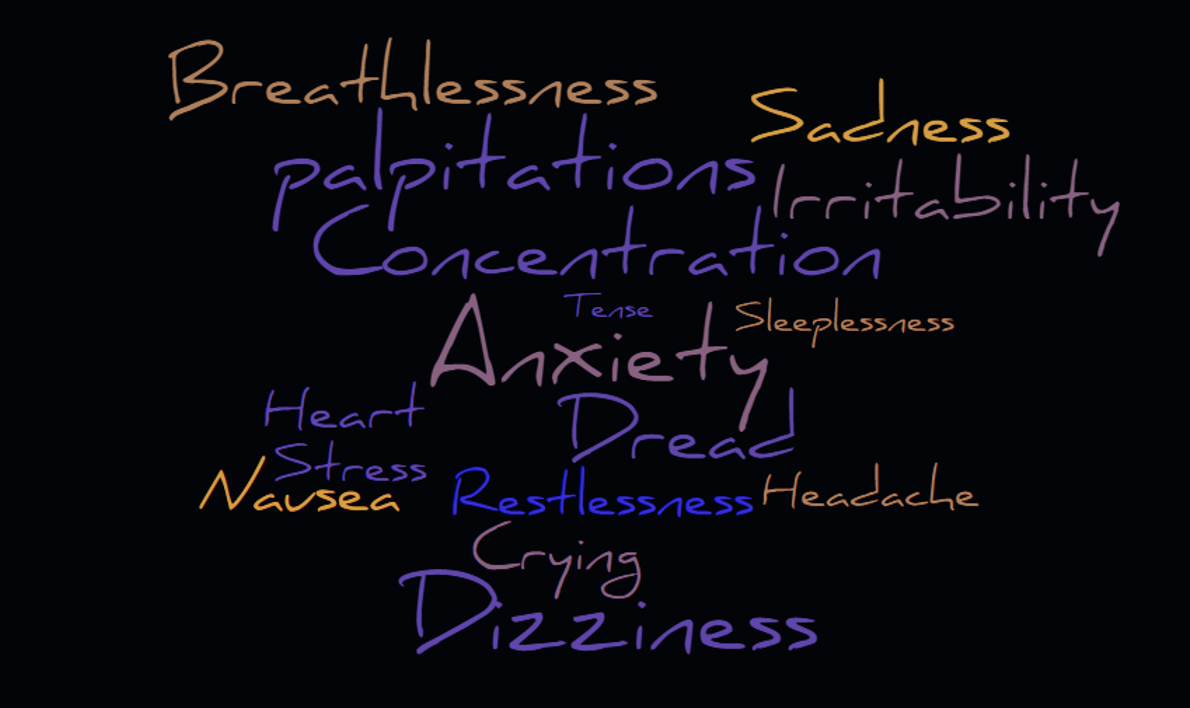
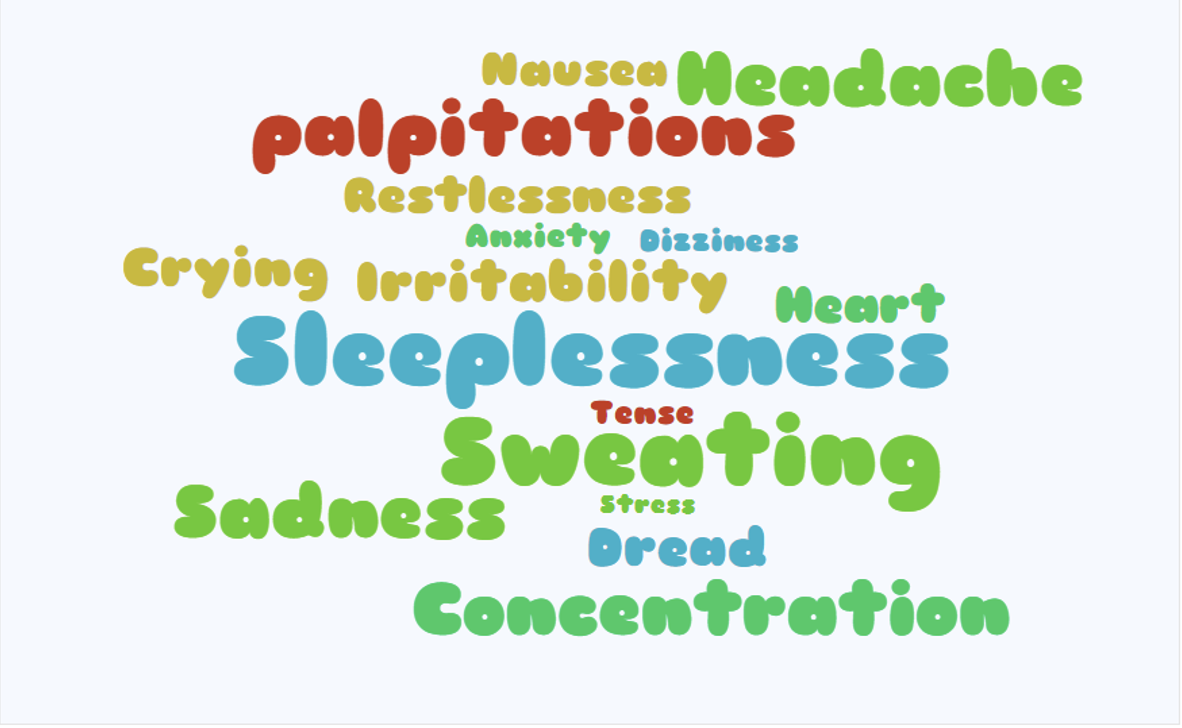
Tips for Improving your Wellbeing
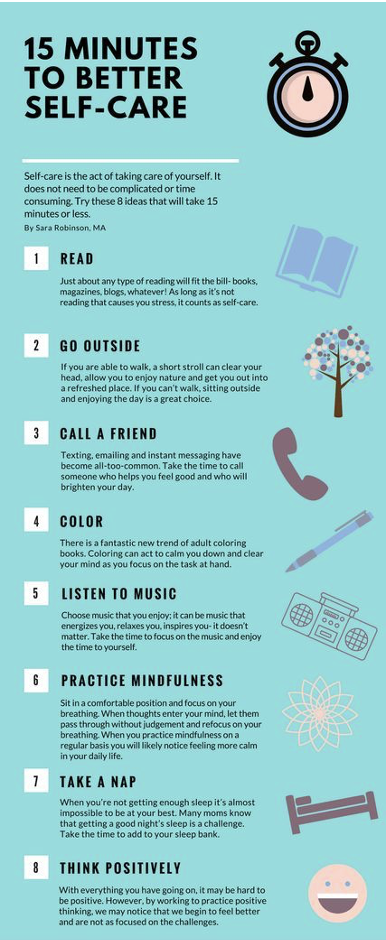
Share: Don’t keep things bottled up. Talking about your feelings with friends, family or your school tutor. It is not a sign of weakness but of taking charge of your own wellbeing.
Balance studying with other activities: follow your passions and keep up your hobbies. You need a break from your studies.
Accept who you are: You are unique. Don’t compare yourself to other people. Each person is on a different journey and following their own path.
Give to others: Helping others makes you feel better about yourself, even something as small as a smile, a thank you or a kind word.

Get active: Regular exercise can boost your self-esteem, help you concentrate and improve your sleep. Walk, cycle, dance or try something completely new.
Eat healthily: There are strong links between what we eat and how we feel. Eat regular meals and make sure you get some fruit and veg every day.
Sleep well: Sleep is important to your physical and mental health. Sleep improves memory and concentration, reduces stress and anxiety.
Unplug: Switch off phones and social media for a short time each day. A change of scene is good for mental health. Go for a walk, sit, think and breathe.
Being Mindful: Mindfulness has been found to massively reduce the symptoms of anxiety. It works by teaching the brain to stay in the present, instead of worrying about the past or future. It can also improve concentration, the ability to focus, and help with academic performance. Mindfulness is about watching your thoughts and feelings without ‘hanging on’ to them for too long. When you ‘hang on’ to thoughts they can become bigger than they should be, especially in minds that are prone to anxiety.
Mindful Techniques:
The 'take a minute' technique: Minds quite like to wander, especially anxious ones, so staying at the moment can take some practice. Here’s how:
- Get comfy and close your eyes.
- Notice your breathing. How does the air feel as you draw it inside you? Notice the sensation of the air, or your belly rising and falling. Notice your heart beating. If your mind starts to wander, come back to this.
- Now, what can you hear? What can you feel outside of you and inside your body? If your mind starts to wander, focus on your breathing again.
The 'drop anchor' technique: This is a really easy technique that can be practised anywhere.
- Stand with your feet firmly on the ground, shoulder-width apart.
- Push down through your feet and feel the ground steady beneath you.
- Notice how your leg muscles feel as you push your feet.
- Pay attention to different parts of your body; starting with your head and working all the way down, until you can feel the connection between your feet and the ground.
- Take 5 deep, slow breaths to finish.
The 'chocolate square' technique: you will need: a small piece of chocolate; a couple of squares from a bar works best.
- Relax your body: Take a few deep breaths and un-tense your muscles to relax your body. You should start your meditation as physically relaxed as possible.
- Smell, gaze, and nibble: Firstly, look at the chocolate and notice everything about it. What texture does it have? Shiny, smooth? Sharp or soft edges?
- Next, smell the chocolate; how does it make you feel? Does your mouth water? Now, take a small bite of your chocolate. Let it sit on your tongue and melt in your mouth. Notice the flavours.
- Let yourself be completely absorbed in what you're experiencing right now. Continue your deep
 breathing, and concentrate on the sensations in your mouth.
breathing, and concentrate on the sensations in your mouth. - Focus on sensations: As you swallow, focus on how it feels going down. Notice how your mouth feels empty. Then, as you take a second bite, try to notice how your arm feels as you raise the chocolate to your mouth, how it feels between your fingers. Again, focus on the sensations you are feeling in the present moment.
- Re-focus on the present: If other thoughts come into your mind during your chocolate meditation, gently refocus your attention on the flavours and sensations associated with the chocolate. Stay in the present as much as you possibly can.
- Savour this feeling: When you're done savouring your chocolate, revisit the feeling throughout your day, and feel more relaxed.
Time Specific Tips
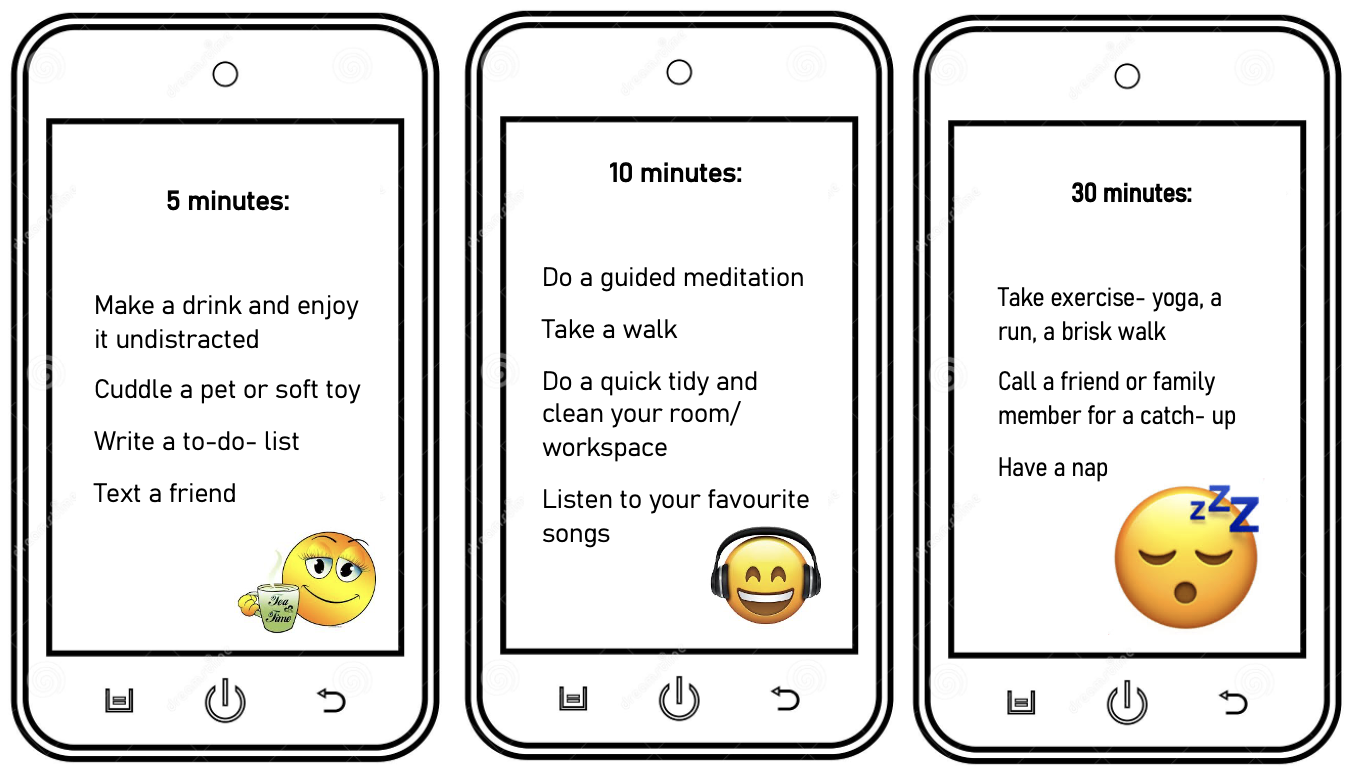
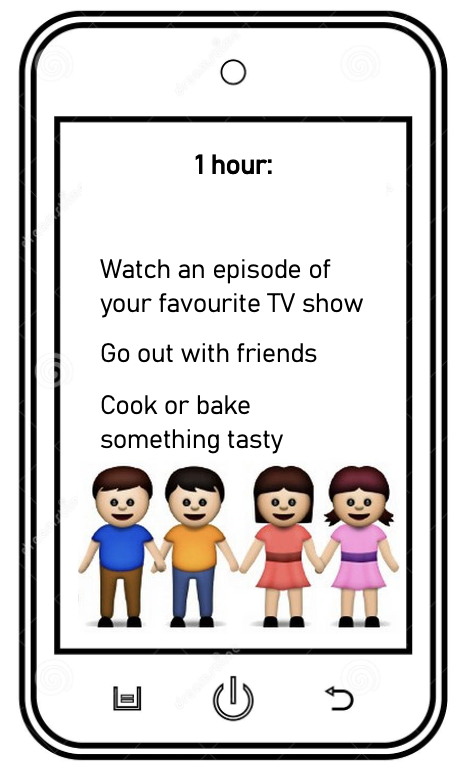
How to Improve Wellbeing
How to Help a Friend
What to do if you think a friend is suffering with a mental health condition or low wellbeing:
- Speak to your friend. Are they worried or sad about something in particular? Does talking through it help, or do they feel no better?
- Speak to a trusted adult about it. They’ll be able to help your friend access the right support.
- Stay in touch with your friends. They might not feel like going out or socialising, but your support is important for them.
Help at SGS
- If you have a problem whilst at school, your first port of call should be your form tutor.
- Your form tutor will be able to give you advice on your problem and point you in the right direction.
- If your problem is linked to schoolwork, your tutor will be able to offer support.
- If you have concerns about your mental health, we advise you to access online support. A list can be found on the contact pages. You can also contact Mrs Thompson, our Wellbeing and Medical Officer.
- Tel: 01775 765800 ext 210 | Email: stjt11@spaldinggrammar.lincs.sch.uk
Useful Links:
Some low-level stress is normal, we know that. But if you feel long periods of low mood or irritability, or you feel like you’re struggling to cope with anything, speak to a trusted adult. This could be a parent, teacher or your GP. It’s far better to have an open conversation with someone else about it, than keep your feelings inside. You can then access any support you need, and feel much better.

There are lots of external support services that are set up to support people with varying needs. Not all will suiteveryone and so it is important you explore the variety of support networks on offer to you. There are a variety of ways you can make contact including online, over the phone, face-to-face, by email and by text.
|
Contact |
Phone Number |
|
Other Information |
|
CRISIS/EMERGENCY/SUICIDE |
|||
|
Police/ Ambulance Service |
999 |
N/A |
Contact when you or anotheris in immediate danger |
|
YoungMinds Text service |
TEXT 85258 |
N/A |
Texts answered by trainedvolunteers and are free. |
|
Samaritans |
116123 |
||
|
CALM |
0800585858 |
N/A |
|
|
PAPYRUS |
08000684141 TEXT: 07786209697 |
||
|
BEREAVEMENT SERVICES |
|||
|
CRUSE |
08088081677 |
||
|
SOBS |
03001115065 |
sobs.support@ hotmail.com |
|
|
DEPRESSION |
|||
|
Mind |
03001233393 TEXT: 86463 |
||
|
YoungMinds |
08088025544 |
ymenquiries@young minds.org.uk |
|
|
The Mix |
08088084994 |
N/A |
|
|
Childline |
08001111 |
N/A |
|
|
ANXIETY |
|||
|
Anxiety UK |
08444775774 TEXT: 07537416905 |
N/A |
|
|
No Panic |
08449674848 |
N/A |
|
|
CBT Online |
N/A |
N/A |
|
|
SELF-HARM |
|||
|
Self-injury Support |
TEXT: 07800472908 |
||
|
EATING DISORDERS |
|||
|
ABC |
03000111213 |
N/A |
|
|
b-eat |
08088010677 |
||
|
PSYCHOSIS |
|||
|
Rethink |
03005000927 |
||
|
SaneLine |
03003047000 |
N/A |
|
|
Hearing Voices |
01142718210 |
||
|
ONLINE COUNSELLING |
|||
|
Kooth |
N/A |
N/A |
|
|
LGBT+ SUPPORT |
|||
|
LGBT Foundation |
03453303030 |
||
|
Stonewall |
N/A |
N/A |
|
|
SUPPORT FOR PARENTS/CARERS |
|||
|
Parent Support Group |
07908101767 |
||
|
Parentline |
08088002222 |
N/A |
|
|
Parent Zone |
020 7686 7225 |
||
|
General- Mental Health and Wellbeing |
|||
|
Shout |
Text 85258 |
Receive immediate support, or go online to access support, information and resources to support mental health |
|
|
NHS- Every Mind Matters |
N/A |
N/A |
Nhs.uk/oneyou/every-mind-matters Expert advice and practical ideas to help everyone look after their mental health independently. |
|
NHS Exercise free workouts
|
N/A |
N/A |
https://www.nhs.uk/live-well/exercise/gym-free-workouts/
|
|
Men's Health- Simple steps to important conversations |
N/A |
N/A |
|
|
Staying Safe Online |
N/A |
N/A |
|

Apps
There are many Apps you can download that have ideas about how to self-help and information about support.
|
CRISIS/EMERGENCY/SUICIDE |
|
StayAlive (http://www.prevent-suicide.org.uk) |
|
BEREAVEMENT SERVICES |
|
Child Bereavement UK (http://childbereavementuk.org/) |
|
Apartofme (https://bounce.works/apartofme/) |
|
DEPRESSION |
|
BASE (Find child and adolescent mental health services (CAMHS) - NHS) |
|
HeadSpace (www.headspace.com) |
|
Moodometer (http://myhealthapps.net/app/details/363/moodometer) |
|
ANXIETY |
|
SAM (http://sam-app.org.uk) |
|
Youper (http://www.youper.ai) |
|
SELF-HARM |
|
CALM HARM (stem4 - supporting teenage mental health) |
|
EATING DISORDERS |
|
Recovery Record (http://www.recoveryrecord.com/) |
|
Rise Up Warriors (http://www.recoverywarriors.com/app/) |
|
PSYCHOSIS |
|
Emoods (http://emoodtracker.com) |


